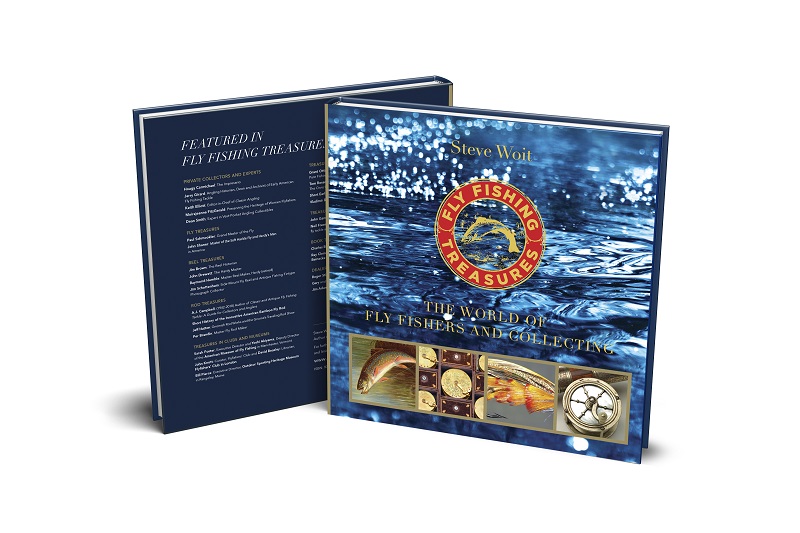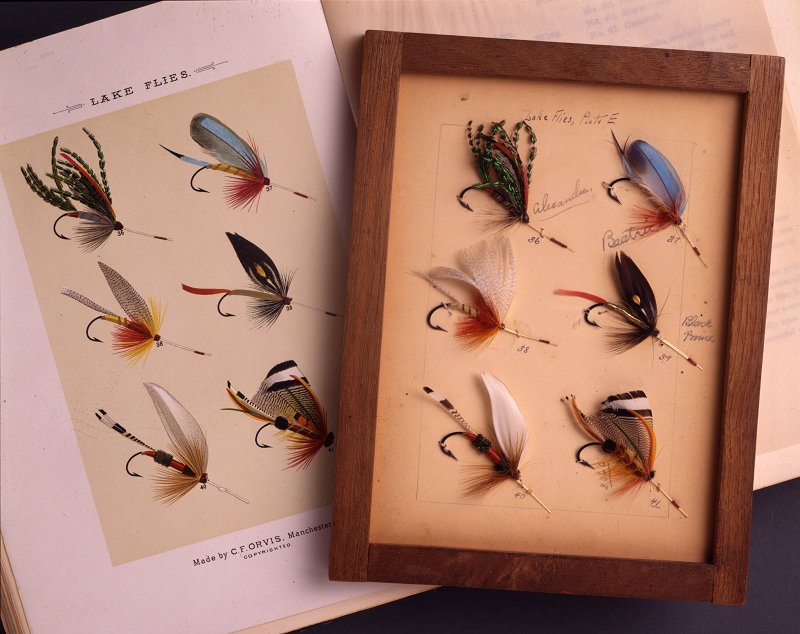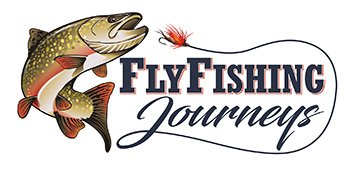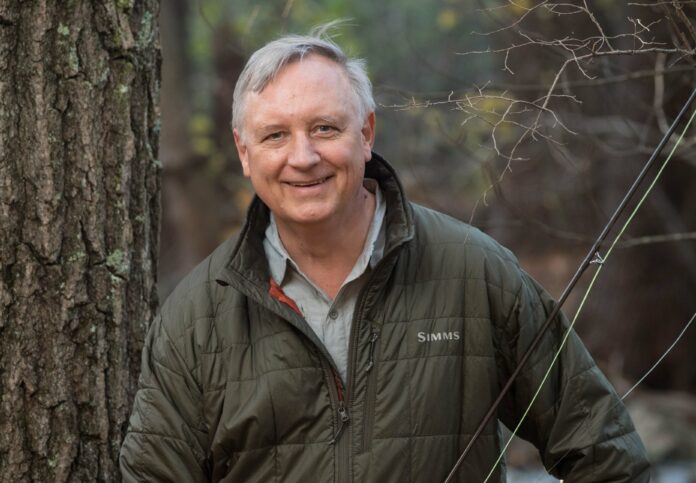Steve Woit is the author of the book Fly Fishing Treasures, a book about antique fly fishing gear and tackle. In this stunning, coffee-table style book, Fly Fishing Treasures, Steve dives straight into the world of fly fishing history and collectibles. These collectibles are like the finest fly fishing antiquities and they are fascinating and beautiful behold.
The art of collecting fly fishing antiques is in and of itself an amazing undertaking.To spend seven years of your life, traveling around the world, studying, documenting and photographing these collections is simply amazing; and that’s just what Steve did.
Steve has been fly fishing for over 40 years, and collecting fly fishing antiques and collectibles for almost as long.
Why did you begin writing? What inspired you to begin?/How long have you been writing or when did you start?
I began writing in college in the late 1970’s for our school’s daily newspaper and then became publisher of a monthly tabloid on campus. Years later, I wrote for the Yale Anglers Journal when it was founded by James Prosek, and eventually for Keith Elliott, the Editor of Classic Angling in the U.K.

How many books have you written and which one is your favorite?
I have written only one book: Fly Fishing Treasures
Have all of your books been about fishing?
Yes, collecting antique fly fishing tackle was my favorite hobby, so I decided to write about it.
Why did you choose to write in the outdoor / fishing genre specifically?
I thought that it was important to share the stories of experts and individual collectors who had been preserving antique fly fishing tackle for decades so that readers could learn something from their stories about the craft of fly fishing, which has a long and fascinating heritage. A few of my subjects are no longer alive, so I am pleased to provide them with at least a modest legacy in print.

What is one thing you wish you knew before beginning outdoor/fish writing?
I wish I had met more outdoor and fishing authors before I began writing. Those that I did meet while I was in the process of writing my book, including Topher Browne, Paul Schmookler, Graydon Hillyard, Keith Elliott and Andrew Herd, among others, were incredibly helpful to me.
Is your being an author a full-time job, or do you have a daily gig too?
Writing is not my full-time job, so more of an avocation for me.
How do you manage a work-life balance as an author?
It’s hard to juggle things and find enough time to write, but I have a very patient and understanding wife and family who are very supportive of my writing.
What is your writing process like?
I tend to begin with a great deal of research and interviews to help answer all of the questions that I am curious about and that I think readers would be interested in. With the interviews, I try to capture the stories that I am told as well as the essential nature of the person who I am interviewing. I believe that everyone has a story to tell that is worth listening to and learning from.

What draws you to fly fishing, both personally and professionally?
I really enjoy both the beautiful natural world where fish are found as well as the global community of fly fishers who pursue them. I guess I am always trying to figure out both the fish and the people!
Have you ever gotten “writer’s block”? If so, how did you cure it? / What has helped or hindered you most when writing a book?
When I get “writer’s block” I try to go fishing to clear my head and that usually helps, particularly if I can get lost in the meditative effect of fly fishing for a while.
Who is your biggest inspiration or mentor?
I found Paul Schmookler and Ingrid Sils’s books on flies and salmon fly tying materials very inspiring and they were both very helpful to me with my own book.

When did you begin fly fishing?
I began fly fishing in the mid 1970s when I was in high school and saved up to buy an Orvis Madison fly rod and attend the Orvis Fly Fishing School during the days that Tom Rosenbauer was teaching there.
Do you remember your first published piece? How long did it take you to get there?
My first published piece was about a bike shop in New Haven and appeared in the Yale Daily News. It took me way too long to write it and it was still heavily edited after I finished it.
With so many publications moving virtual, how does this play a role in your publishing process?
I have learned more and more about photography and the importance of the visual aspect of presenting the material online, as well as how to write more succinctly given the shorter attention span of online readers.

What, to you, are the most important elements of good outdoor and fishing writing?
The story is the key. You need a strong narrative with a beginning, middle and end. This is one reason that recording the stories of actual people while capturing what makes them unique is often so important to a good article or book.
What’s your favorite writing snack or drink?
Coffee, coffee and more coffee.
Do you play music while you write? If so, what is your favorite?
I prefer to write in silence. Maybe this is because I listen to so many interviews that I have taped and keep thinking about people’s actual words and how they express themselves?
Did you grow up around fishing and writing? Please share any thoughts about your family or upbringing that may have led you to become an author.
My aunt, the late Barbara Ford, was a very accomplished author of popular science books as well as fiction and non-fiction works for children. She always encouraged me to write.
Any tips for other aspiring outdoor / fishing authors?
Try to meet as many other outdoor and fishing authors as you can. The conversations I have had while signing books in the authors’ booth at the Fly Fishing Shows with other authors have been awesome. You can learn a great deal from authors like Tom Boyd, Gary Bolger, Topher Browne, John Shewey, Steve Sautner, Ed Engle, Bob Romano, and others.
Who do you trust for objective and constructive criticism of your work?
My friend and editor Val Landi, my wife Janet and other authors I have met over the years.
How do you use social media as an author?
I use Instagram, which is most helpful given the visual aspect of my work, as well as Twitter, where I have followed and retweeted many other fly fishing authors, rod builders, fly tiers, reel makers and others. I also have assembled I think the largest collection on Pinterest of images of antique fly tackle, including rare rods, reels, flies, accessories, ephemera and historical photographs, books and prints.
Where can people find your work? (Retail store, online store, social media handles, etc)
Webpage: www.flyfishingtreasures.com
Twitter: @treasuresfly
Instagram: @flyfishingtreasures
Pinterest: @Fly Fishing Treasures
Any parting thoughts you’d like us to add?
I think it is really important for us to all support the many authors who put in the time and blood, sweat and tears to write wonderful books for us to enjoy, so please buy some books from them!





